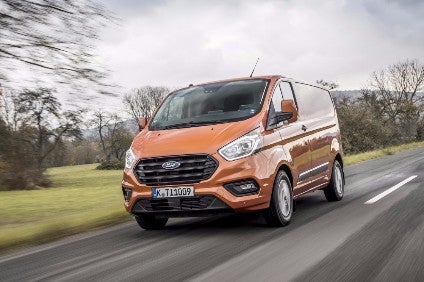
Volkswagen and Ford last night (19 June) announced they had signed a memorandum of understanding and were exploring “a strategic alliance designed to strengthen each company’s competitiveness and better serve customers globally”.
The automakers said they were exploring potential projects across a number of areas – including developing a range of commercial vehicles together to better serve the evolving needs of customers.

Discover B2B Marketing That Performs
Combine business intelligence and editorial excellence to reach engaged professionals across 36 leading media platforms.
The potential alliance would not involve equity arrangements, including cross ownership stakes.
“Ford is committed to improving our fitness as a business and leveraging adaptive business models – which include working with partners to improve our effectiveness and efficiency,” said Jim Farley, Ford’s president of global markets.
“This potential alliance with the Volkswagen Group is another example of how we can become more fit as a business, while creating a winning global product portfolio and extending our capabilities.
“We look forward to exploring with the Volkswagen team in the days ahead how we might work together to better serve the evolving needs of commercial vehicle customers – and much more.”
“We look forward to exploring with the Volkswagen team in the days ahead how we might work together to better serve the evolving needs of commercial vehicle customers – and much more.”
Thomas Sedran, head of VW group strategy said, “Markets and customer demand are changing at an incredible speed. Both companies have strong and complementary positions in different commercial vehicle segments already. To adapt to the challenging environment, it is of utmost importance to gain flexibility through alliances. This is a core element of our Volkswagen Group Strategy 2025. The potential industrial cooperation with Ford is seen as an opportunity to improve competitiveness of both companies globally.”
The companies said they would will provide updates and additional details as talks progressed.
Ford has previously had an alliance with VW in Latin America when, in 1987, the Brazilian and Argentine subsidiaries of Ford and Volkswagen merged into a new holding, named AutoLatina, with VW holding a 51% stake and Ford 49%. Each brand maintained their own corporate image, the marketing and sales structures, as well as independent dealerships and service centres. All other departments were consolidated, allowing significant cost cutting, but also cutting the workforce almost in half.
The two automakers shared engines and jointly developed new models like the Ford Verona/Volkswagen Apollo launched in 1989, a model sharing arrangement similar to that with Mazda in Asia Pacific markets in the 1980s and 90s.
The Latin American alliance ended in 1994.
VW shared Toyota’s Hilux pickup truck model between 1989 and 1997, building both Toyota and VW Taro-badged versions at its Hannover plant in Germany for European markets.
More recently, VW shared Daimler’s large Mercedes Sprinter van, selling its own version as the Crafter. Both companies now produce their own designs though Mercedes now shares smaller light commercial vehicle models with the Nissan-Renault Alliance.
Such model sharing is common in the various commercial vehicles sectors and any alliance between Ford and VW is most likely to bear fruit there first.






